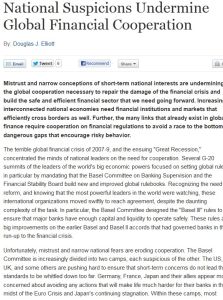Зарегистрируйтесь на getAbstract, чтобы получить доступ к этому краткому изложению.

Зарегистрируйтесь на getAbstract, чтобы получить доступ к этому краткому изложению.
Douglas J. Elliott
National Suspicions Undermine Global Financial Cooperation
Brookings Institution Press, 2013
Что внутри?
Nations’ skepticism about banking reform and integration could prolong the financial crisis.
Recommendation
This brief article offers valuable criticism of world leaders who are backtracking on their promises to repair and improve the financial system via cooperation. Douglas J. Elliott, a former investment banker, explains how nations are looking out for their own interests instead of collaborating to ensure reforms and rules attain a high standard. He highlights the risk of complacency now that the immediate danger of a total financial meltdown has passed. Though it is somewhat vague on details, getAbstract recommends this compact appraisal of the lack of international cooperation in financial regulation to policy makers and investors.
Summary
About the Author
Douglas J. Elliott was an investment banker for twenty years. He is now a fellow of economic studies at the Brookings Institution.


















Comment on this summary